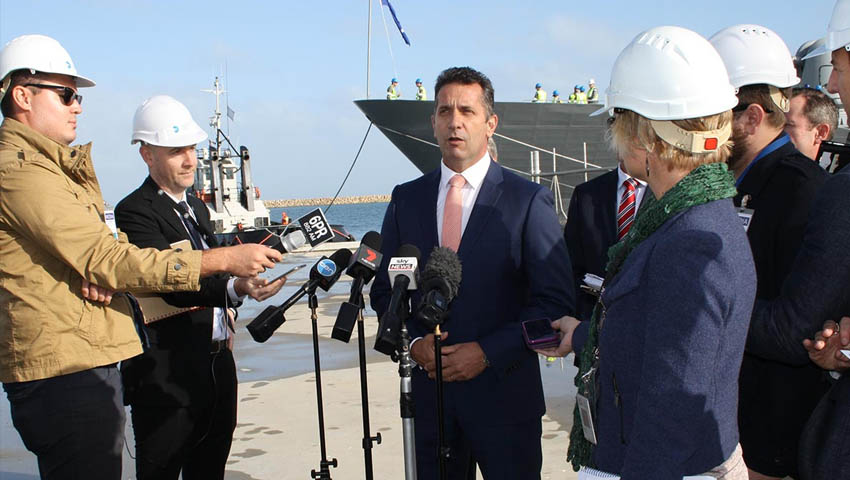West Australian Minister for Defence Issues Paul Papalia has laid the foundation for the state to be at the forefront of cutting-edge science and innovation with the establishment of the Defence Science Centre (DSC).
To continue reading the rest of this article, please log in.
Create free account to get unlimited news articles and more!
Launched by Minister Papalia, the DSC is a collaboration between the state and Commonwealth governments and WA’s four public universities. Minister Papalia said by formalising this partnership, defence-related research opportunities for WA researchers can be maximised.
He said, "Developing a DSC in WA will greatly enhance collaboration between the academic and industry sectors, and makes us part of a broader national network of defence-related research."
One of the DSC’s key roles will be to act as a matchmaker between universities, government and industry to support security and technology development and capability requirements, with a particular focus on WA’s defence industry.
"This will enable WA researchers to more easily link into projects, boosting our own state’s capability and future-proofing WA’s defence industry, keeping and growing skills and knowledge here and creating job opportunities for Western Australians," Minister Papalia added.
University of Western Australia researcher Professor David Badcock is already working as part of a national research team looking at realising the benefits of augmented reality devices.
The minister said the project, which seeks to understand risks and identify ways of realising enhanced capabilities through development of a prototype adaptive AR interface, is a prime example of how the DSC will link WA researchers with cutting-edge defence technology.
The DSC will be governed by a board of academic and industry experts, chaired by Russell Potapinski, GM intelligent and autonomous systems, Woodside. The centre will facilitate university-government-industry research and skills exchange via actively cultivating relationships and linkages.
Potapinski welcomed the appointment, saying, "I’m honoured to take up the position of inaugural chair of the Defence Science Centre.
"I look forward to playing a role in promoting even greater knowledge sharing and collaboration between government, industry and universities. Woodside has a strong track record of collaborative innovation partnerships, including with NASA. Woodside is a big supporter of Western Australian innovation capabilities, including in the area of remote operations – where space, defence and resources share common interests and challenges."
DSC grants will be an important tool in supporting the facilitation of these exchanges and will set the conditions for commercial opportunities in industry, and business development.
The DSC will partner with the Australian Mathematical Sciences Institute’s APR.Intern program to increase the number of internship projects undertaken by SMEs in Western Australia’s defence sector. This partnership will see 10 STEM PhD students placed into industry to undertake short-term focused research projects.
This program encourages university and industry collaboration that connects business and other organisations to the vast research expertise in Australia’s universities, and supports Western Australia’s STEM strategy.
Curtin University deputy vice-chancellor research, Professor Chris Moran, welcomed the announcement, saying, "Curtin University has world-recognised expertise in digital innovation, engineering marine acoustics and a global capability in the issues we face in the future of work.
"Working collaboratively with university partners, this expertise positions us to deliver high-impact research and multi-disciplinary solutions for Australia’s defence and national security needs. We welcome the establishment of the Defence Science Centre."
These comments were echoed by Edith Cowan University vice-chancellor, Professor Steve Chapman, who said, "ECU is committed to making a difference through programs that are relevant and responsive to the real world needs of our community. Defence has an important role to protect Australia and our national interests, which would benefit from our leading-edge research in collaboration with our WA university partners and be greatly assisted by the establishment of the Defence Science Centre."
Eligible industry partners will receive a subsidy through DSC as well as a 50 per cent federal government rebate through APR.Intern’s Supporting more women in STEM careers: Australian Mathematical Sciences Institute - National Research Internship Program (NRIP).
Minister Papalia congratulated all parties involved in the creation of the DCS, including Defence West, the Defence Science Technology Group of the Department of Defence, Curtin University, Edith Cowan University, Murdoch University and the University of Western Australia.
Murdoch University deputy vice-chancellor research and innovation, Professor David Morrison, added, "Murdoch is a research-led university, which focuses on multidisciplinary translational research with real-life impact. We welcome the development of the Defence Science Centre to harness the potential of academic collaboration and innovative thinking at universities to focus on Defence and industry challenges."
"Contributing to the delivery of NRIP, the placements under the APR.Intern program will allow SMEs to cost-effectively tap into specialist research talent with unique skill-sets to advance Western Australian defence innovation," added APR.Intern director and University of Melbourne Enterprise Professor Gary Hogan, AM.
The establishment of the DSC is a key outcome of the McGowan government’s WA Defence and Defence Industries Strategic Plan.
Stephen Kuper
Steve has an extensive career across government, defence industry and advocacy, having previously worked for cabinet ministers at both Federal and State levels.

 Login
Login








